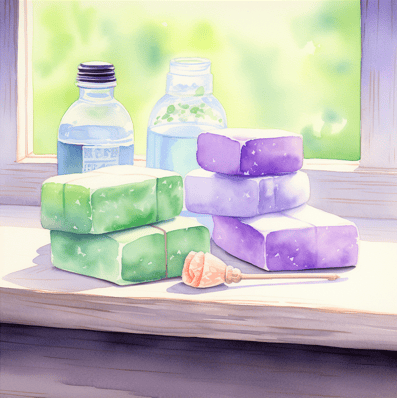
Hey there! If you’re wondering, does palm oil cause acne? You’re not alone. Let’s explore how palm oil might impact your skin and what you can do about it.
Hi, I’m Hazel
I gave up on skincare after years of issues with acne and sensitive skin.
But after going plant-based, my skin cleared up and even started to glow. Now I help women reveal their natural beauty with simple, delicious plant-based food.
I also used to be a nurse, and love nerding out on nutritional science (high-quality science, that is).

As usual, this post is based on the strongest nutritional evidence I could find with a focus on the simplest, most delicious foods
…because who has time to waste on anything less?
The quick version:
Regular palm oil, high in saturated fats, can cause inflammation and potentially worsen acne-prone skin. Palm kernel oil, also high in saturated fats, can clog pores and exacerbate acne. Red palm oil, rich in beta-carotene and lower in saturated fats, supports skin health when used in moderation.
Which Palm Oil Should You Be Worried About?
Palm oil comes in different forms, each with unique properties and effects on the skin. Understanding these differences can help you make better choices for your skin health.
Palm Oil

Regular palm oil is often found in processed foods like cookies, chips, and margarine. It can also be found in some skincare products due to its moisturising properties.
It is high in palmitic acid, a saturated fat.
This high saturated fat content can lead to inflammation, which might contribute to acne breakouts. Therefore it’s less beneficial for skin health due to its higher saturated fat content.
Palm Kernel Oil

Palm kernel oil is commonly used in cosmetics, soaps, and detergents due to its ability to produce a rich lather. This oil may also found in processed foods and confectioneries.
It contains higher levels of lauric and myristic acids, both saturated fats.So its high saturated fat content may also clog pores, making it less suitable for acne-prone skin.
Red Palm Oil
Red palm oil is often used in cooking, especially in African and Southeast Asian cuisines, as well as in some health food products.
It stands out because it is less processed so it retains more nutrients, such as beta-carotene, which can support overall skin health.
Red palm oil is primarily made up of monounsaturated and polyunsaturated fatty acids, making it a healthier choice compared to other palm oils. Using red palm oil in moderation can help protect your skin from vitamin A deficiency and maintain a healthy skin barrier.
Choosing the Right Oil
Understanding the fatty acid content is crucial. Regular palm oil and palm kernel oil are high in saturated fats, which can worsen acne breakouts. On the other hand, red palm oil, with its beneficial nutrients and lower saturated fat content, is a better option for maintaining clear skin and supporting your overall skin health.
What Does the Science Say?

Sorry, But There’s No Hard Evidence
Unfortunately, there is no direct scientific evidence proving that palm oil causes acne.
Indirect Links
What we do know is that diets high in unhealthy fats and processed foods (which often contain palm oil) are associated with poorer skin health and unwanted skin conditions.
These diets can affect blood sugar levels, insulin levels, and hormone levels, which might lead to acne.
While no direct link exists, managing your diet can impact your skin positively.
Oxidised vs. Fresh Palm Oil
Fresh palm oil and red palm oil are generally healthier.
They help the body use nutrients well, support good weight, and boost the immune system.
However, oxidised palm oil, found in many processed foods, can harm organs and cause inflammation. This could worsen acne-prone skin.
Moderation is Key
Eating too much palm oil, even if it’s fresh, can be bad for your liver.
Using it in moderation and reducing its oxidation can lower health risks. Red palm oil has added benefits, like protecting against vitamin A deficiency, which is better for overall skin health.
Implications for Skin Health
These findings suggest that while fresh or red palm oil in moderation might have some health benefits, high levels and oxidised palm oil can be harmful.
For acne-prone skin, avoiding highly processed and oxidised palm oil could help reduce the risk of acne breakouts. Choosing less processed oils and maintaining a diet low in unhealthy fats can support better skin health.
So What Do People Believe?
Palm oil is everywhere, from snacks to skincare products. Its impact on skin health depends on several factors.

High Saturated Fat Content
Palm oil contains high levels of saturated fats. These fats can lead to inflammation, which might cause acne breakouts. If you’re dealing with acne-prone skin, avoiding high-fat processed foods can help.
Comedogenic Properties
On the comedogenic scale, palm oil has a high comedogenic rating, meaning it can clog pores. Clogged pores are a major cause of acne vulgaris. Switching to products without palm oil might help keep your skin clear.
The Exception of Red Palm Oil
There is some debate over whether red palm oil is less comedogenic than regular palm oil. Here’s what you need to know:
Difference in Processing
Red palm oil is less refined than regular palm oil. This means it retains more of its natural nutrients, which can be beneficial for skin health.
Nutrient Content
Red palm oil is rich in antioxidants, such as vitamin E and carotenoids. These nutrients can support healthy skin and may reduce inflammation, which is beneficial for acne-prone skin.
Comedogenic Rating
While red palm oil is still comedogenic, its unrefined nature and high nutrient content might make it less likely to clog pores compared to highly processed palm oil.
However, it is still advisable for those with acne-prone skin to use it cautiously and observe how their skin reacts.
Skin Type and Palm Oil
The impact of palm oil on your skin can vary depending on your skin type.
Oily Skin
If you have oily skin, you’re more prone to acne. Palm oil, with its high comedogenic rating, can worsen this condition by clogging pores. Avoiding palm oil might help reduce acne breakouts.
Dry Skin
While palm oil can moisturise dry skin, its comedogenic properties might still cause breakouts. It’s essential to balance moisture with non-comedogenic options for clear skin.
Sensitive Skin
For those with sensitive skin, palm oil can lead to skin irritation and allergic reactions, further aggravating acne. Opting for gentler, non-comedogenic oils can help maintain healthy skin without irritation.
Alternatives to Palm Oil
Choosing alternatives can benefit your skin and overall health. Here’s how:

Healthier Oils
Opt for oils like olive oil, avocado oil, or coconut oil. These oils are less likely to clog pores and can provide essential nutrients for healthy skin.
Using natural oils instead of palm oil can help maintain a clearer complexion.
Other Plant-Based Oils
Ok, so they are all plant-based above too, but also consider using sunflower oil, soybean oil, or peanut oil. These natural oils are less comedogenic and can support skin health without contributing to acne breakouts.
The Role of Diet in Skin Health
Your diet significantly impacts your skin health and can contribute to or help reduce acne.
Processed Foods and Acne
Diets high in processed foods often contain palm oil and other vegetable oils. These can increase inflammation and affect hormone levels, leading to acne breakouts. Reducing processed food intake can help improve skin health.
Plant-Based Diet Benefits
A plant-based diet can provide numerous benefits for your skin. Consuming whole foods, rich in vitamins and minerals, supports a healthy skin barrier and reduces the likelihood of acne vulgaris. Foods like leafy greens and whole grains help maintain stable blood sugar levels and reduce inflammation.
Healthy Fats
Incorporate healthy fats like those found in olive oil, avocado oil, and coconut oil. These oils nourish your skin without clogging pores, promoting clear skin and overall well-being.
Managing Acne-Prone Skin
If you have acne-prone skin, adopting a careful skincare routine and diet can make a significant difference.
Gentle Cleansing
Use a gentle cleanser suitable for your skin type. This helps remove excess oil and dead skin cellswithout irritating your skin.
Non-Comedogenic Products
Choose skincare products labeled non-comedogenic. These are less likely to contain pore-clogging ingredients. Avoid products with high levels of comedogenic oils like palm oil.
Natural Ingredients
Opt for products with natural ingredients that support skin health. Ingredients like tea tree oil and aloe vera can soothe and help maintain a healthy skin barrier.
Does palm oil cause acne?
So, does palm oil cause acne? While there isn’t direct evidence, its high saturated fat content and high comedogenic rating suggest it might contribute to acne. Opting for healthier oils like argan oil and a plant-based diet can help keep your skin barrier intact and your skin clear. Always remember, your diet plays a significant role in your skin health. Avoiding pore-clogging ingredients and comedogenic oils can make a big difference in maintaining clear and radiant skin.
References
Most references below will link to the original peer-reviewed study itself. However, sometimes I will link to a video over at NutritionFacts.org instead, which is by far the single best resource of brutally transparent nutritional evidence you will ever see. Dr Greger tells a great story about the realities of the science and if I think you will benefit more from one of his videos, the link will take you there instead.
Happy nerding!
- Edem DO. Palm oil: biochemical, physiological, nutritional, hematological, and toxicological aspects: a review. Plant Foods Hum Nutr. 2002;57(3-4):319-341. doi:10.1023/a:1021828132707
- Tan CH, Lee CJ, Tan SN, Poon DTS, Chong CYE, Pui LP. Red Palm Oil: A Review on Processing, Health Benefits and Its Application in Food. J Oleo Sci. 2021;70(9):1201-1210. doi:10.5650/jos.ess21108
- Chiabi A, Kenmogne MH, Nguefack S, et al. The empiric use of palm kernel oil in neonatal skin care: justifiable or not?. Chin J Integr Med. 2011;17(12):950-954. doi:10.1007/s11655-011-0938-1